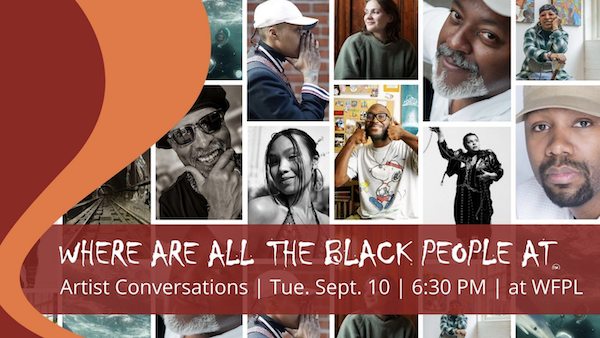
The following announcement was provided by the Watertown Library:
On Tuesday, September 10, the Watertown Free Public Library (WFPL) invites you to join in conversation with celebrated Boston area artists about their work, creative processes, collaborations, and experiences with WHERE ARE ALL THE BLACK PEOPLE AT, a project and movement directed by fine art photographer and Watertown resident Archy LaSalle.
Joining LaSalle for this dialogue are artists Jay Lamour, JaPix Belmer, Maddie Lam, Jules Cleo, Craig Bailey, DaNice D. Marshall, George Annan Jr., Grace Ramsdell, Olivia Slaughter, and Jake Stout.
WHERE ARE ALL THE BLACK PEOPLE AT is a grassroots organization whose mission is to bring attention to and help art institutions rectify past injustices of underrepresenting Black and Brown artists in their permanent collections.
Founder Archy LaSalle states that, “WHERE ARE ALL THE BLACK PEOPLE AT is committed to ensuring that all Black and Brown artists have the freedom to pursue their creativity in all ways, regardless of their family history and culture. Celebrating the art of all artists and particularly the younger generation of Black and Brown artists, WHERE ARE ALL THE BLACK PEOPLE AT will continue to stay vigilant and committed to the importance of access and inclusion to the permanent collections of our art institutions.”
Listen in and join the conversation on Tuesday, September 10 at the Watertown Free Public Library, 6:30–8:30 PM. All are welcome, registration is not required.
Learn more: watertownlib.org/artisttalks
About WFPL
The Watertown Free Public Library provides access to a wide variety of popular materials, resources, services, and programs that fulfill the informational, cultural, and recreational needs of Watertown and surrounding communities. Our Library works to create an environment that attracts and welcomes users of all ages and abilities. watertownlib.org
This was excellent! Thanks Rachel Kay for alerting me to this! It would be great, once the library gets more space, to have monthly panels that discuss community/local issues and/or showcase community members.
The artists on this panel were great at expressing their innermost selves via their artform but also able to communicate how they work and their process so that the average layperson could understand. I learned so much about the artist process. I also was dismayed to learn that MFA, a Boston institution, doesn’t collect this art. Like much else, African American art is American art.